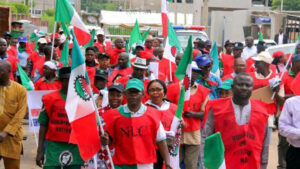
The ongoing discussions between the Nigeria Labour Congress (NLC), Trade Union Congress (TUC), and the government, along with the Organised Private Sector (OPS), about the minimum wage have hit a problem.
The labour unions are unhappy with the government’s offer of N48,000 as the national minimum wage, considering it to be unreasonable.
Joe Ajaero, the President of NLC, expressed his frustration, saying that the government is not taking the negotiations seriously when it comes to the new minimum wage.
He mentioned that the government doesn’t have the necessary information to have meaningful talks with the labour unions. Ajaero emphasized that the government has until the end of the month to make a decision, and if they don’t, the labour unions will take action.
During the meeting, the TUC was represented by its Deputy President, Mr. Tommy Okon.
A joint statement issued by Ajaero and Okon after the meeting expressed their disappointment with the government’s proposal.
They said that the offer of N48,000 as the Minimum Wage is insulting and falls far short of meeting the needs and aspirations of Nigerian workers.
On the other hand, the OPS initially suggested N54,000 as the minimum wage. However, it’s important to note that even the lowest-paid workers in the private sector receive N78,000 per month, as highlighted by the OPS.
This significant difference between the proposed and existing standards shows that employers and the government are not willing to genuinely negotiate a fair national minimum wage for Nigerian workers.
Furthermore, the lack of concrete data from the government to support their offer worsens the situation.
This lack of transparency and trust undermines the credibility of the negotiation process.
As representatives of Nigerian workers, the NLC and TUC cannot accept a wage proposal that would reduce the income of federal-level workers who already receive N30,000 as mandated by law, along with Buhari’s 40% Peculiar allowance (N12,000) and the N35,000 wage award, totaling N77,000.
This would negatively impact the economic well-being of workers and their families, which is unacceptable when determining a national minimum wage.
It’s worth noting that the NLC and TUC have proposed a minimum wage of N615,000 for Nigerian workers, considering the high cost of living.
They believe that this amount is necessary to ensure that workers can meet their basic needs and maintain a decent standard of living.
The ongoing problems with the minimum wage negotiations highlights the significant gap between the expectations of the labour unions and the government’s proposal.
It remains to be seen how the situation will unfold and whether a mutually agreeable resolution can be reached to address the concerns of Nigerian workers.




